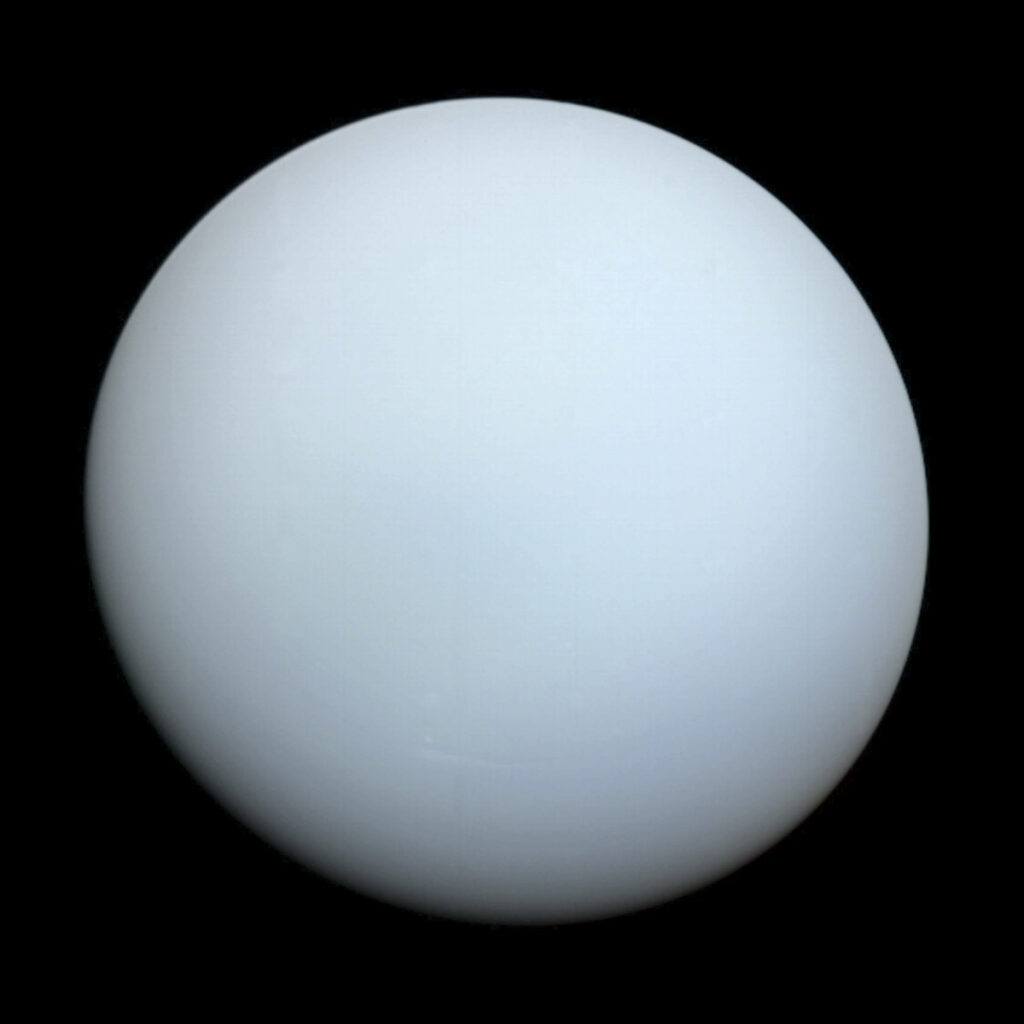Last Reviewed and Updated on July 7, 2022
When it comes to planets in our Solar System, Uranus takes the crown when it comes to puns and jokes. How did Uranus get its name? It’s the only planet that isn’t named after a Roman god which makes the choice of this name even more puzzling. Let’s take a look at who and why gave this planet its name and how the name changed over time.

The discovery of Uranus
Astronomer William Herschel discovered the planet in 1781. He wasn’t sure if what he was observing was a planet or a comet and was even more inclined to the idea that it was a comet. With input from other astronomers of that time, the object was recognized as a planet in 1783. Yay Uranus!
Want to learn more about this planet? Do read our list of facts about Uranus.
It was first named Georgium Sidus
After it was confirmed the newly discovered object was a planet, the honor of naming this newly discovered astronomical body was given to its first observer, Herschel. He didn’t go with the name Uranus.
Herschel’s discovery was a great one. Because of that, King George III became his patron, giving him an annual stipend of £200. Herschel decided to name the newly discovered planed after his patron. He suggested the name Georgium Sidus (George’s star). Not a bad-sounding name.
Herschel gave an explanation as to why he decided on that name;
“In the fabulous ages of ancient times the appellations of Mercury, Venus, Mars, Jupiter and Saturn were given to the Planets, as being the names of their principal heroes and divinities. In the present more philosophical era it would hardly be allowable to have recourse to the same method and call it Juno, Pallas, Apollo or Minerva, for a name to our new heavenly body. The first consideration of any particular event, or remarkable incident, seems to be its chronology: if in any future age it should be asked, when this last-found Planet was discovered? It would be a very satisfactory answer to say, ‘In the reign of King George the Third”.
Herschel
This name wasn’t really popular outside Britain and astronomers were proposing new names for the planet.
Some of the proposed names were Neptune, Herschel in honor of the discovered, Neptune George III, and Neptune Great Britain. An interesting selection of names.
The name Uranus was first proposed in 1782 but took almost 70 years to take
A German astronomer Johann Elert Bode proposed the name Uranus in March 1782. The name Uranus was a Latinized version of the name of the Greek god Ouranos.
He thought the planet should be given a name in a similar manner as other planets were. An appropriate name should be after mythological deities. It certainly makes more sense. Now, which deity would be the right one?
There was logic in his picking of the deity as well. The 5th planet in our Solar System is Jupiter. In mythology, Jupiter is the son of Saturn. Saturn is the 6th planet. As Uranus is the 7th, Bode felt it was appropriate to give it the name after the father of Saturn, Caelus in Ancient Roman mythology, equivalent to Ouranos in Greek mythology.
Bode’s name choice became most widely accepted and became universal in 1850.
As to why Bode choose to use the Ancient Greek god of the sky and not the Ancient Roman one? This remains unknown. It could be a personal preference for how the name sounded. It may be because he viewed Ancient Greek mythology and Ancient Roman mythology were more or less the same. Or it could also be something completely else.
If Bode would follow the “rules” of other planet names, Uranus would be Caelus. No Uranus jokes for us then. That would be unfortunate.
We solved the name mystery.
How did the moons of Uranus get their names?
Most larger moons in our Solar System got their names after mythological deities, with the moons orbiting Uranus being an exception (again). Maybe the choice of names has something to do with the genes.
John Herschel, son of William Herschel named the first moons of Uranus. They were Titania and Oberon (discovered by William Herschel and named by his son). Titania and Oberon are fairies from A Midsummer Night’s Dream by William Shakespeare.
The names of the moons mostly derive from characters from the works of William Shakespeare and a few poems by Alexander pope. Uranus has 27 known moons. Pretty cool, right?
